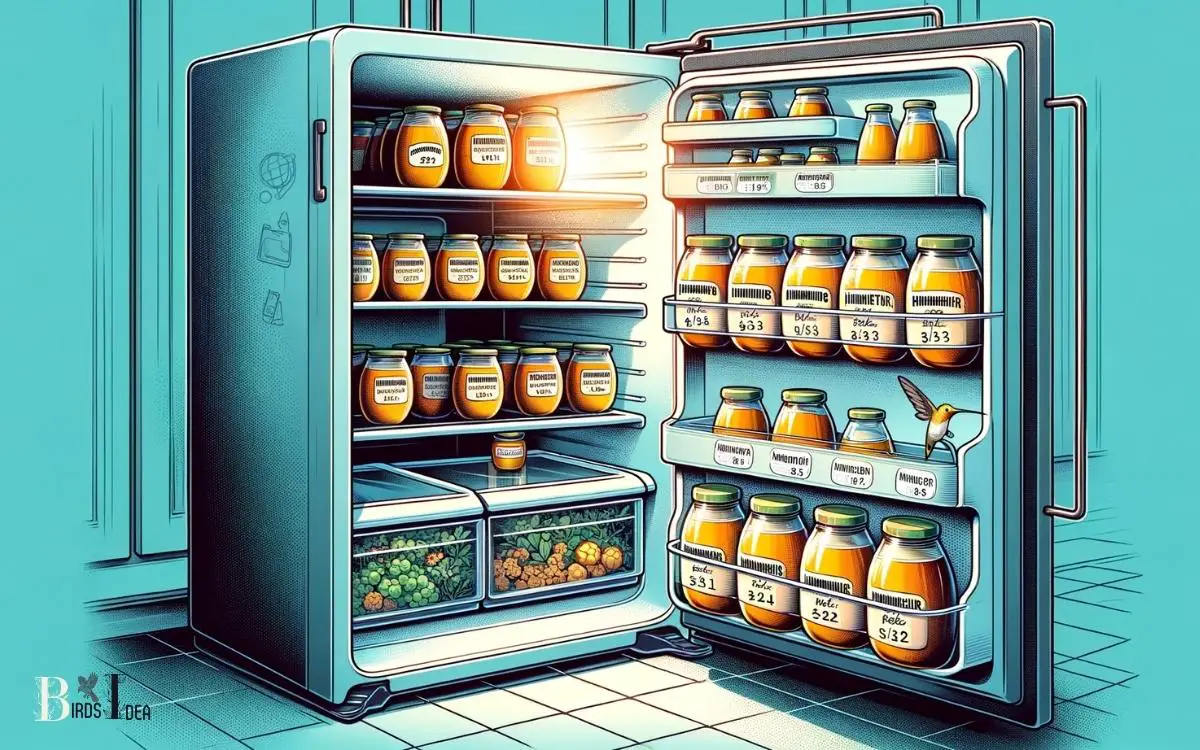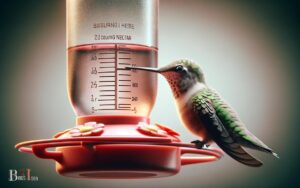Does Hummingbird Nectar Need To Be Refrigerated? Yes!
Yes, hummingbird nectar should be refrigerated when not in use.
This practice extends the shelf life of the nectar and helps prevent the growth of bacteria and mold, ensuring the health and safety of the hummingbirds.
Hummingbird nectar, which is essentially a sugar water solution, is prone to fermentation and bacterial growth, especially in warm temperatures. Refrigerating unused nectar can significantly slow down these processes.
Here are some key points to consider:
Refrigerating hummingbird nectar is essential for maintaining its freshness and safeguarding the health of these delicate birds.

Key Takeaway
Understanding Hummingbird Nectar
Understanding Hummingbird Nectar involves knowing the ideal sugar-to-water ratio for creating a nourishing solution. The recommended ratio is four parts water to one part sugar.
This provides the necessary energy for hummingbirds while also ensuring that the nectar is not too concentrated, which can be harmful to the birds.
It is essential to use white granulated sugar, as alternatives like honey, brown sugar, or artificial sweeteners can be harmful to the birds.
Boiling the water before adding sugar can help to dissolve the sugar completely and prevent fermentation.
it’s crucial to change the nectar every 2-3 days, especially in warmer weather, to prevent the growth of harmful bacteria and mold.
By understanding these key principles, one can provide a healthy and nourishing nectar for the well-being of hummingbirds.
Factors Affecting Nectar Shelf Life
When it comes to the shelf life of hummingbird nectar, several factors come into play. The impact of temperature on nectar, the duration of nectar freshness, and the type of storage container used all influence how long the nectar will remain suitable for hummingbirds.
Understanding these factors is crucial for ensuring that the nectar provided to hummingbirds is safe and beneficial for them.
Temperature Impact on Nectar
Considering the impact of temperature on nectar, proper storage plays a crucial role in maintaining the shelf life of hummingbird nectar.
Temperature greatly affects the degradation rate of nectar. Higher temperatures can cause the nectar to spoil more rapidly, while lower temperatures can slow down the spoilage process.
Ideally, hummingbird nectar should be stored in a cool, dry place, away from direct sunlight and heat sources.
Refrigeration can extend the shelf life of nectar, but it is not always necessary if the nectar is consumed within a few days.
When preparing nectar in large quantities, it is advisable to refrigerate the excess portion to ensure its freshness.
By controlling the storage temperature, one can effectively prolong the shelf life of hummingbird nectar and provide a consistent and high-quality feeding experience for these amazing birds.
Nectar Freshness Duration
The freshness duration of hummingbird nectar is influenced by various factors affecting its shelf life.
- Temperature: Higher temperatures can cause nectar to spoil more quickly.
- Exposure to Sunlight: Direct sunlight can cause nectar to ferment faster.
- Contamination: Ensure the feeder is kept clean and free from debris or mold.
- Seasonal Changes: Nectar may spoil faster in hot weather compared to cooler temperatures.
Storage Container Material
To maintain the freshness of hummingbird nectar, the choice of storage container material significantly impacts its shelf life.
When selecting a storage container for hummingbird nectar, it is important to consider the material of the container.
Glass and food-grade plastic containers are excellent choices for storing nectar. Both materials are nonporous and do not leach harmful chemicals into the nectar, preserving its freshness and quality.
These materials are easy to clean and sanitize, reducing the risk of bacterial contamination that can spoil the nectar.
It is advisable to avoid using metal or copper containers for storing hummingbird nectar, as these materials can react with the nectar and compromise its quality.
By choosing the right storage container material, one can ensure that the hummingbird nectar remains fresh and enticing for these delightful birds.
Importance of Refrigerating Nectar
Refrigerating hummingbird nectar is crucial for preventing spoilage and maintaining its freshness, ultimately ensuring the health and well-being of the hummingbirds that consume it.
By refrigerating nectar, the growth of harmful bacteria and fungi can be slowed down, reducing the risk of contamination that could negatively impact the hummingbirds’ health.
Keeping nectar chilled can help preserve its nutritional content, providing the birds with essential nutrients for their energy and sustenance.
Nectar Spoilage Prevention
Properly refrigerating hummingbird nectar can significantly reduce the risk of spoilage and maintain its freshness for longer periods.
To prevent nectar spoilage and ensure the well-being of the hummingbirds, consider the following tips:
- Keep nectar refrigerated at all times when not in use to slow down the growth of bacteria and yeast.
- Store nectar in a clean, airtight container to prevent contamination and maintain its quality.
- Regularly check the nectar for any signs of cloudiness, mold, or unusual odors, and discard if any of these are present.
- Always prepare nectar in small batches to ensure that it is consumed within a few days, reducing the likelihood of spoilage.
Hummingbird Health Benefits
Refrigeration of hummingbird nectar significantly contributes to the health and well-being of the hummingbirds, ensuring the freshness and safety of the nectar they consume.
Hummingbirds rely on the nectar as their primary source of energy, and it is crucial to maintain its nutritional integrity.
Refrigerating the nectar helps to inhibit the growth of harmful bacteria and yeast, safeguarding the hummingbirds from potential infections and illnesses.
Furthermore, the cool temperature slows down the fermentation process, preserving the nectar’s quality for a longer period.
By serving refrigerated nectar, you prioritize the well-being of these tiny creatures, allowing them to thrive and flourish in your surroundings.
It is a simple yet impactful way of caring for these remarkable birds and ensuring they receive the best possible nourishment.
Alternatives to Refrigeration
One alternative to refrigerating hummingbird nectar is to store it in a cool, shaded area. This method helps maintain the nectar’s freshness without the need for refrigeration.
Here are some other alternatives to refrigeration:
- Keep the nectar in airtight containers to prevent spoilage.
- Use smaller portions of nectar to ensure it is consumed within a few days.
- Clean and sanitize the feeder regularly to prevent bacterial growth.
- Add a small amount of citric acid to the nectar to extend its shelf life.
Can I Store Hummingbird Nectar Without Refrigeration?
Storing hummingbird nectar without refrigeration is possible, even when making hummingbird food with maple syrup. It is recommended to prepare smaller batches of nectar and place it in a clean, airtight container. Store it in a cool, dark place away from direct sunlight. Keeping the nectar fresh by replacing it every 2-3 days will ensure its quality and appeal to these delightful birds.
Risks of Unrefrigerated Nectar
To properly assess the risks of unrefrigerated nectar, it is essential to consider the potential impact on the nectar’s freshness and safety.
When hummingbird nectar is left unrefrigerated, there is an increased risk of fermentation and spoilage.
The warm temperatures can create an environment conducive to the growth of harmful bacteria and molds, potentially posing a threat to the health of the hummingbirds.
Unrefrigerated nectar may attract ants, bees, and other insects, which could contaminate the nectar and deter hummingbirds from feeding.
Furthermore, exposure to sunlight and heat can cause the nectar to degrade more rapidly, leading to a loss of nutrients and potential harm to the birds.
Therefore, it is important to prioritize the refrigeration of hummingbird nectar to maintain its freshness and safety for the delicate creatures it serves.
Conclusion
Refrigerating hummingbird nectar is essential for prolonging its shelf life and preserving its quality.
According to a recent study, nectar that is refrigerated can last up to two weeks, while unrefrigerated nectar may spoil within a few days.
Proper storage and refrigeration are crucial to providing a healthy and safe source of nectar for hummingbirds.






